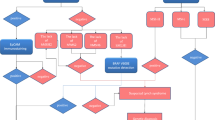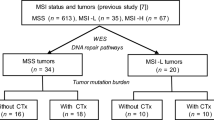Abstract
Defective DNA mismatch repair creates a strong mutator phenotype, recognized as microsatellite instability (MSI). Various next-generation sequencing-based methods for evaluating cancer MSI status have been established, and NGS-based studies have thoroughly described MSI-driven tumorigenesis. Accordingly, high-frequency MSI (MSI-H) has been detected in 81 tumor types, including those in which MSI was previously underrated. The findings have increased the use of immunotherapy, which is assumed to be efficient in tumors having a high mutation burden and/or neoantigen load. In MSI tumorigenesis, positively and negatively selected driver gene mutations have been characterized in colorectal cancers. Recent advancements in genome-wide studies of MSI-H cancers have developed novel diagnostic and therapeutic approaches, including CXCR2 inhibitor, a synthetic lethal therapy targeting the Werner gene and inhibition of nonsense-mediated mRNA decay. MSI is a predictive marker for chemotherapy as well as immunotherapy. Thus, analyses of MSI status and MSI-related alterations in cancers are clinically relevant. We present an update on MSI-driven tumorigenesis, focusing on a novel landscape of diagnostic and therapeutic approaches.






Similar content being viewed by others
References
Aaltonen LA, Peltomaki P, Leach FS et al (1993) Clues to the pathogenesis of familial colorectal cancer. Science 260:812–816
Ballal VVJ (2014) Oral medicine: Amlexanox. Br Dent J 217:208
Behan FM, Iorio F, Picco G et al (2019) Prioritization of cancer therapeutic targets using CRISPR-Cas9 screens. Nature 568:511–516
Bhuvanagiri M, Schlitter AM, Hentze MW, Kulozik AE (2010) NMD: RNA biology meets human genetic medicine. Biochem J 430:365–377
Bokhari A, Jonchere V, Lagrange A et al (2018) Targeting nonsense-mediated mRNA decay in colorectal cancers with microsatellite instability. Oncogenesis 7:70
Chan WK, Bhalla AD, Le Hir H et al (2009) A UPF3-mediated regulatory switch that maintains RNA surveillance. Nat Struct Mol Biol 16:747–753
Chan EM, Shibue T, McFarland JM et al (2019) WRN helicase is a synthetic lethal target in microsatellite unstable cancers. Nature 568:551–556
Chang L, Chang M, Chang HM, Chang F (2018) Microsatellite instability: a predictive biomarker for cancer immunotherapy. Appl Immunohistochem Mol Morphol 26:e15–e21
Corso S, Isella C, Bellomo SE et al (2019) A comprehensive PDX gastric cancer collection captures cancer cell-intrinsic transcriptional MSI traits. Cancer Res 79:5884–5896
Domingo E, Freeman-Mills L, Rayner E et al (2016) Somatic POLE proofreading domain mutation, immune response, and prognosis in colorectal cancer: a retrospective, pooled biomarker study. Lancet Gastroenterol Hepatol 1:207e16
El-Bchiri J, Buhard O, Penard-Lacronique V et al (2005) Differential nonsense mediated decay of mutated mRNAs in mismatch repair deficient colorectal cancers. Hum Mol Genet 14:2435–2442
El-Bchiri J, Guilloux A, Dartigues P et al (2008) Nonsense-mediated mRNA decay impacts MSI-driven carcinogenesis and anti-tumor immunity in colorectal cancers. PLoS One 3:e2583
Eso Y, Shimizu T, Takeda H, Takai A, Marusawa H (2020) Microsatellite instability and immune checkpoint inhibitors: toward precision medicine against gastrointestinal and hepatobiliary cancers. J Gastroenterol 55:15–26
Foltz SM, Liang WW, Xie M, Ding L (2017) MIRMMR: binary classification of microsatellite instability using methylation and mutations. Bioinformatics 33:3799–3801
Fujimoto A, Fujita M, Hasegawa T, Wong JH, Maejima K, Oku-Sasaki A, Nakano K, Shiraishi Y, Miyano S, Yamamoto G, Akagi K, Imoto S, Nakagawa H (2020) Comprehensive analysis of indels in whole-genome microsatellite regions and microsatellite instability across 21 cancer types. Genome Res 30:334–346
Galon J, Angell HK, Bedognetti D, Marincola FM (2013) The continuum of cancer immunosurveillance: prognostic, predictive, and mechanistic signatures. Immunity 39:11–26
Ganesh K, Stadler ZK, Cercek A et al (2019) Immunotherapy in colorectal cancer: rationale, challenges and potential. Nat Rev Gastroenterol Hepatol 16:361–375
Gargiulo P, Della Pepa C, Berardi S et al (2016) Tumor genotype and immune microenvironment in POLE-ultramutated and MSI-hypermutated endometrial cancers: new candidates for checkpoint blockade immunotherapy? Cancer Treat Rev 48:61–68
Gelsomino F, Barbolini M, Spallanzani A, Pugliese G, Cascinu S (2016) The evolving role of microsatellite instability in colorectal cancer: a review. Cancer Treat Rev 51:19–26
Georgiadis A, Durham JN, Keefer LA et al (2019) Noninvasive detection of microsatellite instability and high tumor mutation burden in cancer patients treated with PD-1 blockade. Clin Cancer Res 25:7024–7034
Hänggi K, Ruffell B (2019) Oncogenic KRAS drives immune suppression in colorectal cancer. Cancer Cell 35:535–537
Havel JJ, Chowell D, Chan TA (2019) The evolving landscape of biomarkers for checkpoint inhibitor immunotherapy. Nat Rev Cancer 19:133–150
Hirata T, Yamamoto H, Taniguchi H et al (2007) Characterization of the immune escape phenotype of human gastric cancers with and without high-frequency microsatellite instability. J Pathol 211:516–523
Hirotsu Y, Nagakubo Y, Amemiya K et al (2020) Microsatellite instability status is determined by targeted sequencing with MSIcall in 25 cancer types. Clin Chim Acta 502:207–213
Imai K, Yamamoto H (2008) Carcinogenesis and microsatellite instability: the interrelationship between genetics and epigenetics. Carcinogenesis 29:673–680
Innocenti F, Ou FS, Qu X et al (2019) Mutational analysis of patients with colorectal cancer in CALGB/SWOG 80405 identifies new roles of microsatellite instability and tumor mutational burden for patient outcome. J Clin Oncol 37:1217–1227
Ionov Y, Peinado MA, Malkhosyan S, Shibata D, Perucho M (1993) Ubiquitous somatic mutations in simple repeated sequences reveal a new mechanism for colonic carcinogenesis. Nature 363:558–561
Jonchere V, Marisa L, Greene M et al (2018) Identification of positively and negatively selected driver gene mutations associated with colorectal cancer with microsatellite instability. Cell Mol Gastroenterol Hepatol 6:277–300
Kategaya L, Perumal SK, Hager JH, Belmont LD (2019) Werner syndrome helicase is required for the survival of cancer cells with microsatellite instability. iScience 13:488–497
Kather JN, Pearson AT, Halama N et al (2019) Deep learning can predict microsatellite instability directly from histology in gastrointestinal cancer. Nat Med 25:1054–1056
Katoh H, Wang D, Daikoku T et al (2013) CXCR2-expressing myeloid-derived suppressor cells are essential to promote colitis-associated tumorigenesis. Cancer Cell 24:631–644
Kawasaki T, Ohnishi M, Suemoto Y et al (2008) WRN promoter methylation possibly connects mucinous differentiation, microsatellite instability and CpG island methylator phenotype in colorectal cancer. Mod Pathol 21:150–158
Lazzari L, Corti G, Picco G et al (2019) Patient-derived xenografts and matched cell lines identify pharmacogenomic vulnerabilities in colorectal cancer. Clin Cancer Res 25:6243–6259
Le DT, Uram JN, Wang H et al (2015) PD-1 blockade in tumors with mismatch-repair deficiency. N Engl J Med 372:2509–2520
Le DT, Durham JN, Smith KN et al (2017) Mismatch repair deficiency predicts response of solid tumors to PD-1 blockade. Science 357:409–413
Le DT, Kim TW, Van Cutsem E et al (2020) Phase II open-label study of pembrolizumab in treatment-refractory, microsatellite instability-jigh/mismatch repair-deficient metastatic colorectal cancer: KEYNOTE-164. J Clin Oncol 38:11–19
Liao W, Overman MJ, Boutin AT et al (2019) KRAS-IRF2 axis drives immune suppression and immune therapy resistance in colorectal cancer. Cancer Cell 35:559–572
Lieb S, Blaha-Ostermann S, Kamper E et al (2019) Werner syndrome helicase is a selective vulnerability of microsatellite instability-high tumor cells. Elife. 8:e43333
Llosa NJ, Cruise M, Tam A et al (2015) The vigorous immune microenvironment of microsatellite instable colon cancer is balanced by multiple counter-inhibitory checkpoints. Cancer Discov 5:43–51
Llosa NJ, Luber B, Siegel N et al (2019) Immunopathologic stratification of colorectal cancer for checkpoint blockade immunotherapy. Cancer Immunol Res 7:1574–1579
Mandal R, Samstein RM, Lee KW et al (2019) Genetic diversity of tumors with mismatch repair deficiency influences anti-PD-1 immunotherapy response. Science 364:485–491
Marabelle A, Le DT, Ascierto PA et al (2020) Efficacy of pembrolizumab in patients with noncolorectal high microsatellite instability/mismatch repair-deficient cancer: results from the phase II KEYNOTE-158 study. J Clin Oncol 38:1–10
McGranahan N, Furness AJS, Rosenthal R et al (2016) Clonal neoantigens elicit T cell immunoreactivity and sensitivity to immune checkpoint blockade. Science 351:1463–1469
Mittica G, Ghisoni E, Giannone G et al (2017) Checkpoint inhibitors in endometrial cancer: preclinical rationale and clinical activity. Oncotarget 8:90532–90544
Mlecnik B, Bindea G, Angell HK et al (2016) Integrative analyses of colorectal cancer show immunoscore is a stronger predictor of patient survival than microsatellite instability. Immunity 44:698–711
Nebot-Bral L, Brandao D, Verlingue L et al (2017) Hypermutated tumours in the era of immunotherapy: the paradigm of personalised medicine. Eur J Cancer 84:290–303
O’Neil BH, Wallmark JM, Lorente D et al (2017) Safety and antitumor activity of the anti-PD-1 antibody pembrolizumab in patients with advanced colorectal carcinoma. PLoS One 12:e0189848
Overman MJ, McDermott R, Leach JL et al (2017) Nivolumab in patients with metastatic DNA mismatch repair-deficient or microsatellite instability-high colorectal cancer (CheckMate 142): an open-label, multicentre, phase 2 study. Lancet Oncol 18:1182–1191
Overman MJ, Lonardi S, Wong KYM et al (2018) Durable clinical benefit with nivolumab plus ipilimumab in DNA mismatch repair-deficient/microsatellite instability-high metastatic colorectal cancer. J Clin Oncol 36:773–779
Ozcan M, Janikovits J, von Knebel Doeberitz M, Kloor M (2018) Complex pattern of immune evasion in MSI colorectal cancer. Oncoimmunology 7:e1445453
Panda A, Mehnert JM, Hirshfield KM et al (2018) Immune activation and benefit from Avelumab in EBV-positive gastric cancer. J Natl Cancer Inst 110:316–320
Popp MW, Maquat LE (2018) Nonsense-mediated mRNA decay and cancer. Curr Opin Genet Dev 48:44–50
Razavi P, Li BT, Brown DN et al (2019) High-intensity sequencing reveals the sources of plasma circulating cell-free DNA variants. Nat Med 25:1928–1937
Ruiz-Bañobre J, Goel A (2019) DNA mismatch repair deficiency and immune checkpoint inhibitors in gastrointestinal cancers. Gastroenterology 156:890–903
Russo M, Crisafulli G, Sogari A et al (2019) Adaptive mutability of colorectal cancers in response to targeted therapies. Science 366:1473–1480
Schrock AB, Ouyang C, Sandhu J et al (2019) Tumor mutational burden is predictive of response to immune checkpoint inhibitors in MSI-high metastatic colorectal cancer. Ann Oncol 30:1096–1103
Steele CW, Karim SA, Leach JDG et al (2016) CXCR2 inhibition profoundly suppresses metastases and augments immunotherapy in pancre- atic ductal adenocarcinoma. Cancer Cell 29:832–845
Thibodeau S, Bren G, Schaid D (1993) Microsatellite instability in cancer of the proximal colon. Science 260:816–819
Usuki F, Yamashita A, Higuchi I et al (2004) Inhibition of nonsense-mediated mRNA decay rescues the phenotype in Ullrich’s disease. Ann Neurol 55:740–744
Wang C, Liang C (2018) MSIpred: a python package for tumor microsatellite instability classification from tumor mutation annotation data using a support vector machine. Sci Rep 8:17546
Yamamoto H, Imai K (2015) Microsatellite instability: an update. Arch Toxicol 89:899–921
Yamamoto H, Imai K (2019) An updated review of microsatellite instability in the era of next-generation sequencing and precision medicine. Semin Oncol 46:261–270
Yamamoto H, Adachi Y, Taniguchi H et al (2012) The interrelationship between microsatellite instability and microRNA in gastrointestinal cancer. World J Gastroenterol 18:2745–2755
Yamamoto H, Watanabe Y, Maehata T et al (2014) An updated review of gastric cancer in the next-generation sequencing era: insights from bench to bedside and vice versa. World J Gastroenterol 20:3927–3937
Author information
Authors and Affiliations
Corresponding author
Ethics declarations
Conflict of interest
The authors declare that they have no conflict of interest.
Additional information
Publisher's Note
Springer Nature remains neutral with regard to jurisdictional claims in published maps and institutional affiliations.
Rights and permissions
About this article
Cite this article
Yamamoto, H., Watanabe, Y., Maehata, T. et al. Microsatellite instability in cancer: a novel landscape for diagnostic and therapeutic approach. Arch Toxicol 94, 3349–3357 (2020). https://doi.org/10.1007/s00204-020-02833-z
Received:
Accepted:
Published:
Issue Date:
DOI: https://doi.org/10.1007/s00204-020-02833-z




